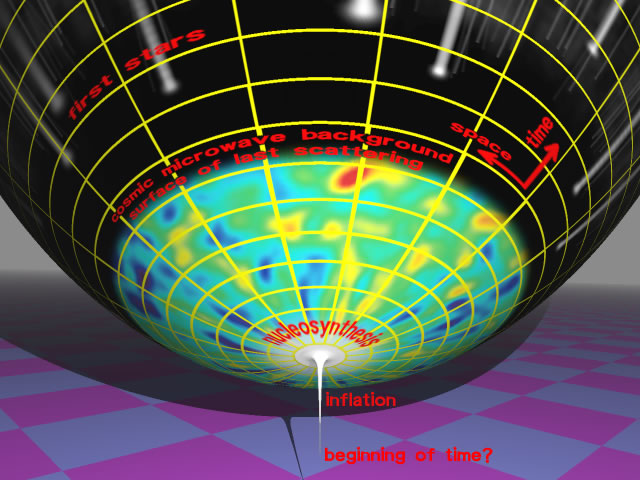Big Bang Theory
16.7 - Understand how the expansion of the Universe supports both the Big Bang theory and the Steady State theory16.8 - Understand the major observational evidence in favour of the Big Bang theory:
quasars (QSOs) | cosmic microwave background (CMB) radiation | Hubble Deep Field image
The Big Bang is a theory to explain the origin of the Universe. It is a theory that is largely accepted by scientists because evidence fits some observations. There are some things in the Universe that question it however.
By looking at very far away objects we are seeing objects as they appeared only a few billion years after the Big Bang.
What happened?
The Universe is thought to have expanded from a single point called a singularity around 13.7 billion years ago. Within the first second of creation, matter and antimatter were created. hydrogen and helium were created and these are the most abundant elements in the Universe today. Within minutes of the Big Bang the temperature of the Universe exceeded 10,000 million°. It gradually cooled enough for stars to form.
Arguments for the theory
Scientists observed that galaxies are moving away from each other. Evidence from the Hubble Deep Field is just one of many sources that prove this. Quasars are evidence of fast moving objects formed early in the universe by the big bang. Cosmic Microwave Radiation is considered to be a leftover form of heat produced by the big bang.
Arguments against the theory
Whist it may be accepted that the Big Bang originated from a singularity, today scientist cannot agree on its nature or formation. Measurements of mass in the known Universe do not account for its rate of expansion in the Universe. Scientists believe that dark matter, that we cannot currently see or measure, compensates for this mass.
Arguments For & Against
| For | Against |
|---|---|
| The Universe continues to expand. | What caused the Big Bang to happen and what happened in the first milliseconds of it happening? |
| Cosmic Microwave Radiation is thought to be leftover heat from the Big Bang. | There does not seem to be enough mass in the Universe to account for its expansion. Dark matter may be responsible. |
| Hydrogen and helium are the most abundant elements in the Universe. The Big Bang would have produced these elements |
Interactive
Questions
- Describe what is thought to have occured in the first stages of the Big Bang.
- Describe the arguments both in favour and against the Big Bang theory.
Links
- NASA: Ask an Astrophysicist Origins of the Universe
- Big Bang Theory Investigate the Big Bang
- Schools Observatory Big Bang
- How stuff works Scientific problems with the theory


 | © All Rights Reserved |
| © All Rights Reserved |